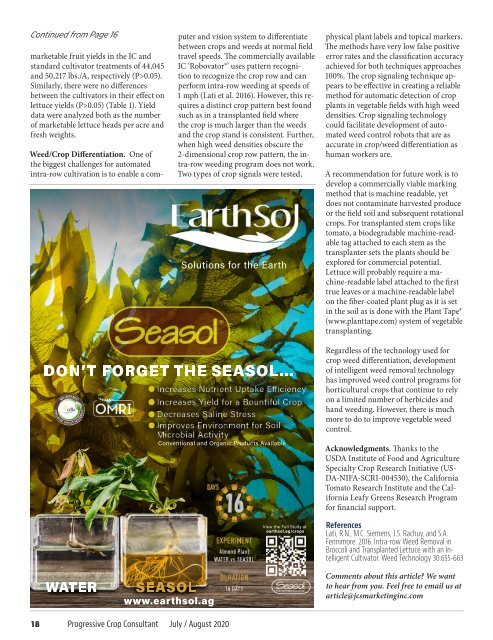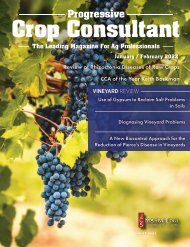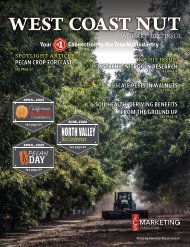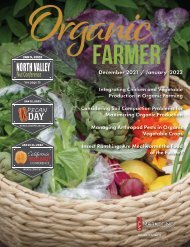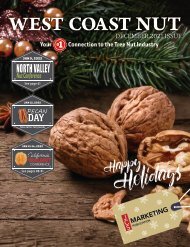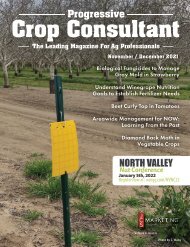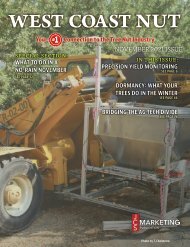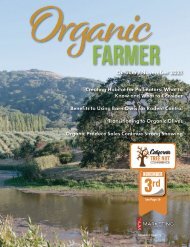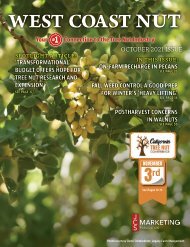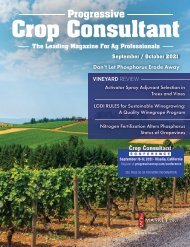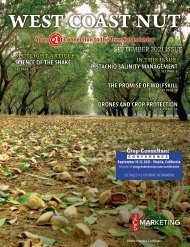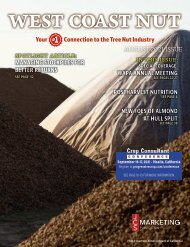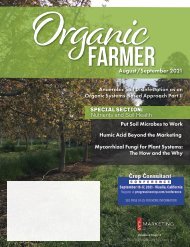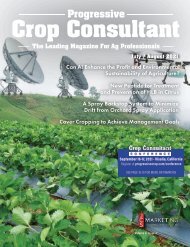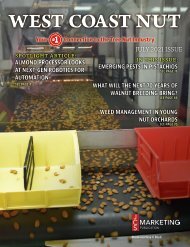Create successful ePaper yourself
Turn your PDF publications into a flip-book with our unique Google optimized e-Paper software.
Continued from Page 16<br />
marketable fruit yields in the IC and<br />
standard cultivator treatments of 44,045<br />
and 50,217 lbs./A, respectively (P>0.05).<br />
Similarly, there were no differences<br />
between the cultivators in their effect on<br />
lettuce yields (P>0.05) (Table 1). Yield<br />
data were analyzed both as the number<br />
of marketable lettuce heads per acre and<br />
fresh weights.<br />
Weed/Crop Differentiation. One of<br />
the biggest challenges for automated<br />
intra-row cultivation is to enable a computer<br />
and vision system to differentiate<br />
between crops and weeds at normal field<br />
travel speeds. The commercially available<br />
IC ‘Robovator®’ uses pattern recognition<br />
to recognize the crop row and can<br />
perform intra-row weeding at speeds of<br />
1 mph (Lati et al. 2016). However, this requires<br />
a distinct crop pattern best found<br />
such as in a transplanted field where<br />
the crop is much larger than the weeds<br />
and the crop stand is consistent. Further,<br />
when high weed densities obscure the<br />
2-dimensional crop row pattern, the intra-row<br />
weeding program does not work.<br />
Two types of crop signals were tested,<br />
Solutions for the Earth<br />
physical plant labels and topical markers.<br />
The methods have very low false positive<br />
error rates and the classification accuracy<br />
achieved for both techniques approaches<br />
100%. The crop signaling technique appears<br />
to be effective in creating a reliable<br />
method for automatic detection of crop<br />
plants in vegetable fields with high weed<br />
densities. Crop signaling technology<br />
could facilitate development of automated<br />
weed control robots that are as<br />
accurate in crop/weed differentiation as<br />
human workers are.<br />
A recommendation for future work is to<br />
develop a commercially viable marking<br />
method that is machine readable, yet<br />
does not contaminate harvested produce<br />
or the field soil and subsequent rotational<br />
crops. For transplanted stem crops like<br />
tomato, a biodegradable machine-readable<br />
tag attached to each stem as the<br />
transplanter sets the plants should be<br />
explored for commercial potential.<br />
Lettuce will probably require a machine-readable<br />
label attached to the first<br />
true leaves or a machine-readable label<br />
on the fiber-coated plant plug as it is set<br />
in the soil as is done with the Plant Tape®<br />
(www.planttape.com) system of vegetable<br />
transplanting.<br />
DON’T FORGET THE SEASOL...<br />
Increases Nutrient Uptake Efficiency<br />
Increases Yield for a Bountiful Crop<br />
Decreases Saline Stress<br />
Improves Environment for Soil<br />
Microbial Activity<br />
Conventional and Organic Products Available<br />
View the Full Study at<br />
earthsol.ag/crops<br />
Regardless of the technology used for<br />
crop weed differentiation, development<br />
of intelligent weed removal technology<br />
has improved weed control programs for<br />
horticultural crops that continue to rely<br />
on a limited number of herbicides and<br />
hand weeding. However, there is much<br />
more to do to improve vegetable weed<br />
control.<br />
Acknowledgments. Thanks to the<br />
USDA Institute of Food and Agriculture<br />
Specialty Crop Research Initiative (US-<br />
DA-NIFA-SCRI-004530), the California<br />
Tomato Research Institute and the California<br />
Leafy Greens Research Program<br />
for financial support.<br />
References<br />
Lati, R.N., M.C. Siemens, J.S. Rachuy, and S.A.<br />
Fennimore. 2016. Intra-row Weed Removal in<br />
Broccoli and Transplanted Lettuce with an Intelligent<br />
Cultivator. Weed Technology 30:655-663<br />
WATER<br />
SEASOL<br />
www.earthsol.ag<br />
Comments about this article? We want<br />
to hear from you. Feel free to email us at<br />
article@jcsmarketinginc.com<br />
18 Progressive Crop Consultant <strong>July</strong> / <strong>August</strong> <strong>2020</strong>


